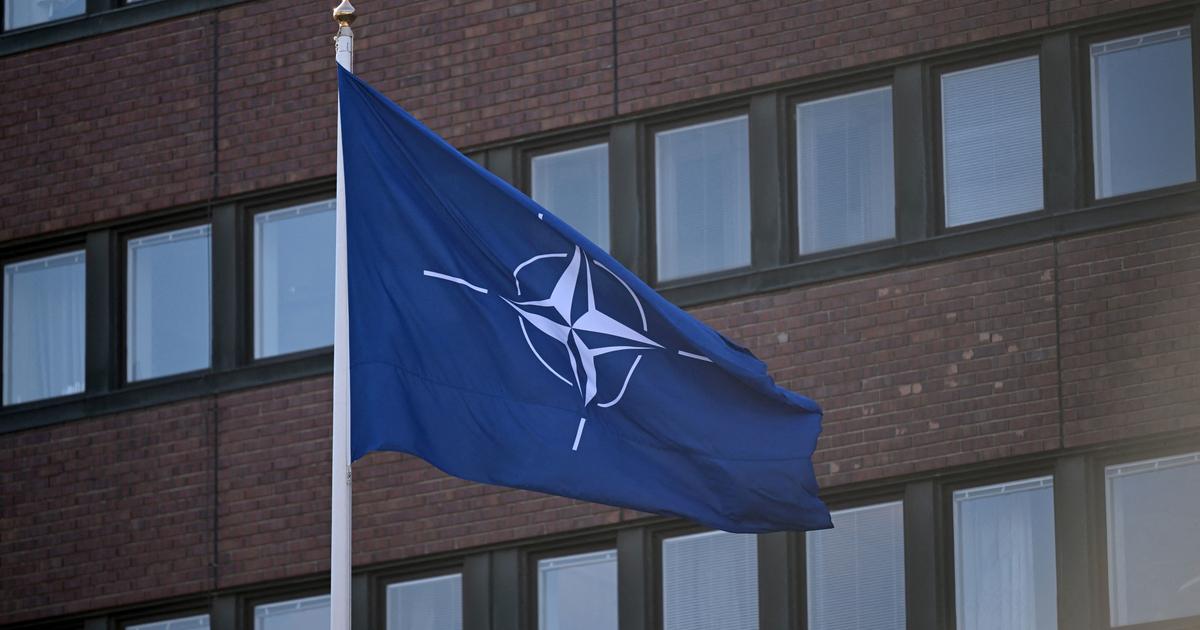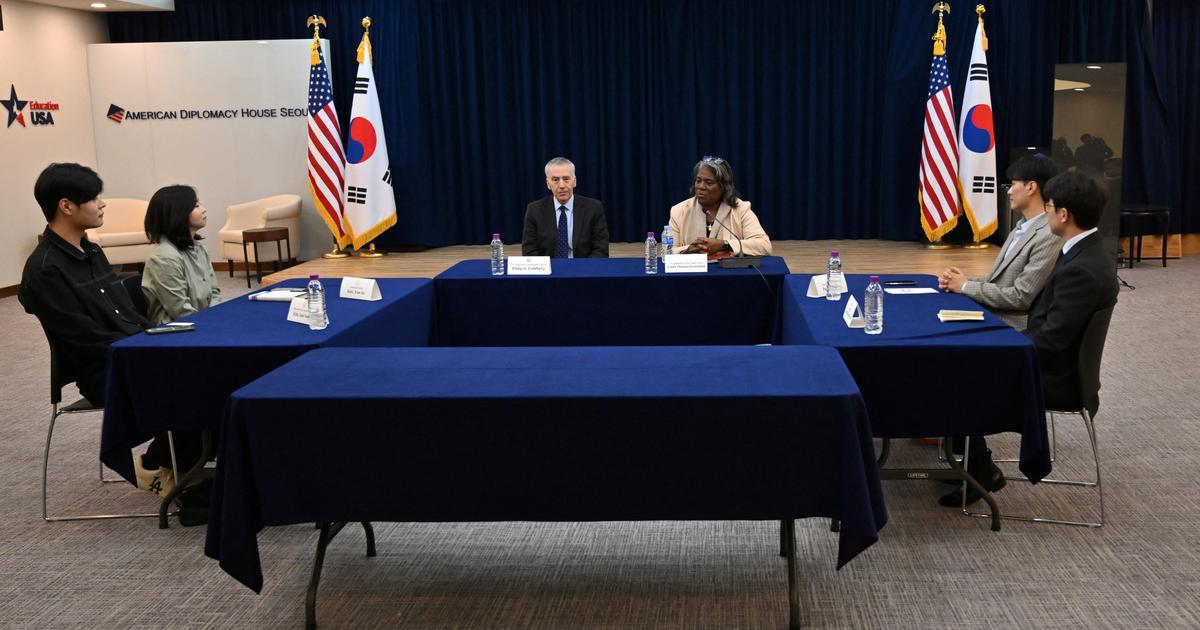Three years had passed since the last edition of the forum which, in what is already a tradition of the week of the United Nations General Assembly in New York, brings together political and economic leaders from both sides of the Atlantic around the call of EL PAÍS and the Spain-United States Chamber of Commerce.
But what three years!
A pandemic that brought the planet to a halt, shortages and breaks in supply chains unprecedented in the history of globalization, inflation more typical of distant times, central banks desperate to change the course of things and a war in Europe that threatens to unleash a food crisis.
All these ingredients for interesting times set the background, certainly gloomy, to the speeches and interviews of the fifth edition of the meeting,
Gustavo Petro, president of Colombia (left), in conversation with Jan Martínez Ahrens, director of EL PAÍS América.
John Arredondo
The appointment was attended by two presidents, the Spanish, Pedro Sánchez, and the Colombian, Gustavo Petro, who closed a morning of work in which, under the title of Latin America, the United States and Spain in the global economy, they spoke climate change, logistics, energy transition, tourism and education, among other issues, and the perspective of transatlantic relations, crucial, said the Spanish Minister of Foreign Affairs, José Manuel Albares, to "face the complex scenario geopolitics of the present.
It became inevitable that geopolitics would dominate everything when it was the turn of the leaders.
New York had woken up full of world leaders and Vladimir Putin's threats to resort to nuclear force, mobilize 300,000 civilians and call referendums in the pro-Russian areas of Ukraine dominated all the conversations.
Sánchez condemned the Kremlin's bravado, reaffirmed Spain's commitment to defending the attacked country and issued a warning: "We are entering a critical phase, Putin already knows that he is losing the war."
José Manuel Albares, Minister of Foreign Affairs, European Union and Cooperation of Spain (left), greets Manuel Tovar, Minister of Foreign Trade of Costa Rica.
John Arredondo
In this new reality, he added, the best idea is to continue working as a team, as part of the coalition of the European Union, the United States and the rest of the members of the G-7.
But not only on the war front;
also to navigate the stormy waters of a panorama that looks bad, but in which Spain, according to Sánchez's "prudent optimism", is in a "better position than other European economies".
"It has grown this year above the EU average," he said.
“The consensus is that we will exceed 4% [growth] in 2022 and 2% in 2023. We have 330,000 more employees than last year.
We are at an unemployment rate that is at its lowest since 2008. The percentage of temporary jobs is below 20%, and we are breaking a dynamic of historical precariousness.
In the tourism sector we are practically at pre-pandemic data.
Exports of goods have grown by 20%.
We have much stronger fundamentals than in the past, households and businesses are much less indebted.
Our country is much more resilient.
These figures invite us to trust the Spanish economy to invest”.
Petro, for his part, took advantage in an interview conducted by the director of EL PAÍS América, Jan Martínez Ahrens, of the inertia of the defiant speech he offered the day before at the UN, an environmental plea in which he questioned the war on drugs, to speak for the first time on the Ukrainian crisis, 45 days after becoming the first left-wing president of Colombia.
He announced that he is joining the common front with his Mexican counterpart, Andrés Manuel López Obrador, which will result in a declaration calling for the creation of a UN committee with a view to declaring a truce of at least five years in the war in Ukraine. .
“Russia's invasion of Ukraine is just as bad as Iraq and Syria's,” he added.
From the left: Pedro Sánchez, President of the Spanish Government, Joseph Oughourlian, President of Prisa, and Mariano Jabonero, Secretary General of the OEI.
John Arredondo
The role of Colombia in Latin America (there was talk of Venezuela, the total disarmament of the guerrillas and how to combat, with the help of the United States, climate change in the Amazon jungle) was another of the main ideas of his speech.
And the continent was the protagonist of the day from its very beginning, which was led by Joseph Oughourlian, president of Prisa, editor of EL PAÍS, a "multi-Latin" company, as he defined it, in which 70% of its income and results come from Latin America.
“We have decided to invest heavily in the region in recent years,” recalled Oughourlian.
Hence, the newspaper, with the support of the rest of the group, has strengthened its newsrooms and editions in Mexico, Colombia, Chile or Argentina, but also its presence in the United States.
Support net
The Spain-United States Chamber of Commerce, whose president, Alan D. Solomont, recalled in his speech that one of its missions is to facilitate “the connection with a wide network of business organizations, government authorities, professional and trade associations, and prominent dignitaries”, in order to strengthen commercial ties between both countries.
Alan D. Solomont, President of the Spain-United States Chamber of Commerce.
John Arredondo
Spanish companies present in the region such as Iberia, Abertis, Hiberus and Repsol participated in the forum and pointed out the investment and business opportunities that are opening up even in a world with economic uncertainty such as the current one in sectors such as air transport, infrastructures and renewable energies.
"Spain is and will continue to be the gateway to Europe for Latin America," warned Minister Albares later, who promised to use the next turn of the presidency of the EU Council to strengthen those ties.
Ties celebrated by the Minister of Foreign Trade of Costa Rica, Manuel Tovar, who asserted the status of his country as an island of "sustainability, protection of the environment and respect for the rights of workers" in the increasingly convulsive context of Central America , with authoritarian outbursts in neighboring Nicaragua and El Salvador.
Economically, Tovar advanced that they would increasingly look to the Pacific commercial front, through their exchanges with countries like Ecuador.
"Our continent, unfortunately, remains too poorly integrated," he lamented.
Christian Asinelli, Corporate Vice President of Strategic Planning at CAF-Development Bank of Latin America.Juan Arredondo
Given this reality, Christian Asinelli, corporate vice president of Strategic Programming at CAF-Development Bank of Latin America, opted for the reinforcement of Latin America and the Caribbean as "a region of solutions" for the uncertainties arising from the pandemic and the war in Ukraine .
“We are capable of promoting the energy transition,” explained Asinelli, and for this he applied to the multilateral organization for which he works as a tool for the future.
"Some member countries have gas reserves that can help the energy transition, and there is capacity for water projects that allow increasing food production," he added.
Greater digitization
The educational perspective was served by Mariano Jabonero, general secretary of the Organization of Ibero-American States (OEI), founded in 1949 and based in Madrid.
Jabonero, who called for a greater commitment to the digitization of education (he advocated a hybrid education, in which the digital transformation is strengthened, access to broadband and the technological skills of teachers are improved, and access to homes to the Internet), emphasized the need to bridge the gap between education and productivity.
“The future is none other than virtual, technological and digital.
It is an educational challenge, but also a political and economic one”, he concluded.
Tim Robertson, CEO Americas, DHLGlobal Forwarding.
John Arredondo
The most optimistic note was put, in the midst of so many bad omens, by Tim Robertson, CEO for the Americas of the logistics multinational DHL.
His company belongs to one of the sectors most affected in the early stages of the pandemic, when it seemed that the countries were closing in on themselves in a new paradigm that later was not so much.
But they also discovered that from that adversity emanated the virtue of electronic commerce, which took a great leap forward in this time of confinement and uncertainty.
Supply chains later showed their weakest face, but Robertson is counting on intercontinental freight capacity to return to pre-pandemic levels by the end of this winter.
"It's been a terrible two and a half years,
but they have at least demonstrated the essential role of trade in improving people's quality of life”.
In part, he added, thanks to the fact that the logistics sector has had no choice but to prove its “resilience”.
Word of recent coin that was last Thursday among the most listened to in New York.
From left: Lisa Schineller, managing director of Americas Sovereign Ratings at S&P Global Ratings;
Carla Arimont, Vice President of the Official Spanish Chamber of Commerce in the US;
and Ernesto Revilla, Managing Director and Head of Latin American Economy at Citigroup.
John Arredondo
economic uncertainty
The forum Latin America, the United States and Spain in the global economy stopped to analyze the economic situation in which the different areas find themselves.
Many of those attending the meeting organized in New York by EL PAÍS and the Spain-United States Chamber of Commerce were still present in the room when the Federal Reserve announced the fifth rise in official interest rates of the year and its president, Jerome Powell , warned that the fight against inflation is a priority, even if it is at the cost of cooling down the economy.
During the forum, sponsored by Abertis, Baker McKenzie, Hiberus and Iberia, with the collaboration of the OEI (Organization of Ibero-American States), Lisa Schineller, director of Sovereign Ratings for the Americas at S&P Global Ratings, highlighted how the risk of economic recession due to the war in Ukraine, inflation and the rise in interest rates to combat it.
In the United States, she sees a 50% chance of a recession, a growing risk for 2023, although at the moment her central scenario in the second half is of low growth, but growth nonetheless.
Schineller stressed that in Spain the economy has given some positive surprises in terms of growth thanks to the recovery of tourism, but she also warned of the risks that the war,
Ernesto Revilla, managing director and head of economics for Latin America at Citigroup, noted how uncertainty over many factors is making it more difficult than ever to make reliable macroeconomic forecasts for Latin America.
The possibility that the United States enters a recession and that inflation will fall due to more aggressive rises in interest rates will condition the evolution.
"So far the surprise is that Latin America is doing very well this year despite all the difficulties in the international environment," he said.
“We have had to revise growth forecasts for this year upwards in several countries.
The bad news is that for 2023, in principle, the forecasts are for weak growth”, he added, highlighting that in several countries such as Mexico,
In Chile and Colombia, political uncertainty has somewhat cooled investor sentiment.
In the medium term, however, Latin America has solid fundamentals for great growth potential in the context of some reconfiguration of supply chains to avoid as much dependence on China, he explained.















